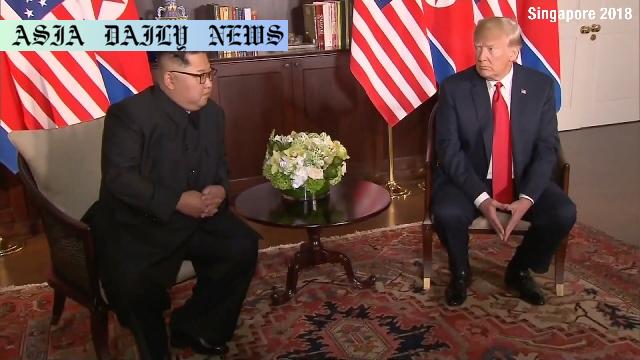South Korea expresses worry over US policy changes under Trump, reaffirming commitment towards a denuclearized North Korea.
President Trump refers to North Korea as a nuclear power, sparking concerns in South Korea.
South Korea stresses the international commitment to denuclearize North Korea.
The South Korean government affirms its alliance with the US and supports strict adherence to the Nuclear Non-Proliferation Treaty.

Introduction
President Donald Trump’s reference to North Korea as a nuclear power during his speech has sparked concerns among South Korean officials and experts. The remarks, which differ in tone from longstanding US policy of denuclearization, have raised alarms about a potential policy shift that might affect peace and stability in the Korean Peninsula. These concerns are particularly profound as tensions in the region continue to escalate due to North Korea’s nuclear ambitions.
South Korea’s Official Response
Following Trump’s comments, South Korea’s Foreign Ministry promptly issued a formal statement. The ministry highlighted that North Korea’s nuclear program violates the Nuclear Non-Proliferation Treaty (NPT) and multiple United Nations Security Council resolutions. It affirmed that North Korea could never be recognized as a legitimate nuclear power. The statement also reinforced South Korea’s commitment to work in close collaboration with the US and the international community to achieve the denuclearization of North Korea. This reflects South Korea’s consistent stance of advocating for sanctions and diplomatic measures to curb Pyongyang’s nuclear ambitions.
Potential Shifts in US Policy
Analysts in South Korea are concerned that President Trump’s remarks might signal a deviation from the previous US administration’s approach towards North Korea. Historically, the US has maintained a firm denuclearization policy through diplomatic negotiations and economic pressure. Trump’s language, however, might be interpreted as a tacit acknowledgment of North Korea’s nuclear capabilities, which could undermine efforts to isolate Pyongyang on the global stage. This potential shift has led to speculation about how the Trump administration plans to address the North Korean challenge, with some fearing a less confrontational approach could embolden Kim Jong-un’s regime.
Strong Alliance between South Korea and the US
During a cabinet meeting on Tuesday, Acting President of South Korea, Choi Sang-mok, reinforced the significance of the US-South Korea alliance, which he compared to a deep-rooted tree that flourishes regardless of external pressures. Choi expressed confidence in the alliance’s ability to bring about substantial progress in achieving shared objectives, including denuclearization and regional stability. This assurance underscores South Korea’s reliance on its partnership with the US to navigate the complexities of regional security dynamics.
International Implications
North Korea’s nuclear ambitions have long been a source of tension in East Asia and a focal point of global concern. The potential for a leadership shift in US policy represents a significant development for other regional players, including Japan and China. Japan shares South Korea’s apprehensions and relies heavily on US commitments to regional security. Meanwhile, China, a key stakeholder, often acts as a mediator but has been criticized for not taking stronger measures against North Korea’s nuclear activities. Any changes in US policy would necessitate recalibration among these nations as they collectively seek to address the nuclear issue.
Conclusion
President Trump’s comments about North Korea as a nuclear power have set off significant speculation and debate, particularly in South Korea. The South Korean government remains committed to a denuclearized Korean Peninsula and emphasizes the importance of international cooperation in achieving this goal. The reaffirmation of the strong US-South Korea alliance serves as a reminder of the shared efforts required to prevent the proliferation of nuclear weapons and ensure regional security. As the Trump administration begins to outline its foreign policy goals, all eyes will be on the direction it takes regarding this critical issue.
Commentary
Implications of Trump’s Remarks on North Korea
President Donald Trump’s characterization of North Korea as a nuclear power raises interesting questions about the trajectory of US foreign policy in East Asia. His remarks have stirred concerns in South Korea and among international observers, who fear that this could represent a softening stance towards North Korea’s nuclear program. As regional tensions remain high, carefully calibrated policies are essential to maintain stability and mitigate risks of escalation.
The Importance of the US-South Korea Alliance
One of the most critical aspects of this development is the enduring alliance between South Korea and the United States. Over the past seven decades, this partnership has served as a cornerstone for peace, security, and development in the region. President Trump’s remarks need to be contextualized within the broader US-South Korea strategic framework, which emphasizes denuclearization as a core objective. While concerns about policy shifts are valid, the alliance’s strong foundation provides some reassurance of continued collaboration.
The Road Ahead
Moving forward, it will be essential for allies like South Korea and Japan to stay united and work closely with the international community to address North Korea’s nuclear threat. Transparent communication with the US administration will be invaluable in clarifying intentions and maintaining a coordinated approach. As President Trump’s foreign policy evolves, the global community must remain vigilant and responsive, ensuring that steps are taken to prevent the legitimization of North Korea as a nuclear power.


